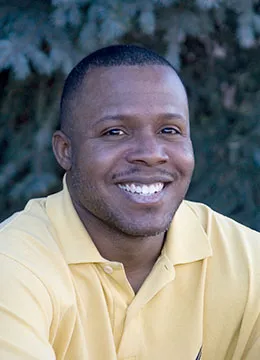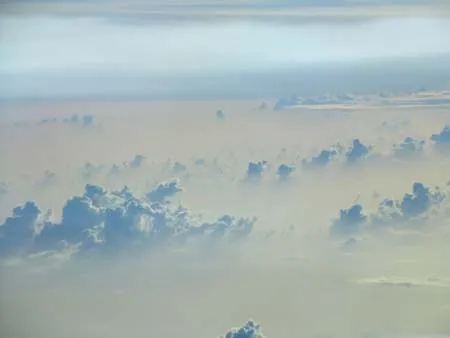Aaron Pratt - Ph.D. candidate
On top of every storm

Aaron Pratt, Ph.D. candidate, Howard University. Pratt participated in the SOARS Program and as a graduate student visitor in NCAR's Advanced Study Program.
©UCAR, photo by Carlye Calvin
"As far back as I can remember, I've always been curious about storms," says Aaron Pratt. When he was a small boy, his mother compared him to Sesame Street's Count von Count because they both got so excited whenever there was thunder and lightning.
His attention was focused further by Hurricane Hugo in 1989. The fifth-grade boy watched in fascination as Hugo devastated the islands of St. Croix and Puerto Rico and then took aim at the beaches near his hometown of Fayetteville, North Carolina.
None of Pratt's friends shared his interest as he was growing up, and there were no clubs or organizations where he could develop his weather-watching hobby. But by his freshman year in high school, he had already decided that he would go to college and major in meteorology.
Just planning to attend college was something of a triumph. Neither of his parents was college educated, and Pratt—the third of 11 brothers and sisters—is the only one in his generation who has continued his education past high school.
However, he says his parents always expected him to go on. "I was always considered 'the smart one.' While my parents couldn't tell me about college from personal experience, that didn't stop them from pushing me in that direction," he says. "They pushed for all of us to go as far as we could educationally. Their attitude was, if that's what you want to do, there's no reason why you can't.
"I'd love for all my brothers and sisters to go to college," Pratt adds. "It's a great growth opportunity. You get a chance to become your own person and fully flesh out your identity. I would strongly urge anyone who has any thoughts about it to just go ahead and do it."
‘While my parents couldn't tell me about college from personal experience, that didn't stop them from pushing me in that direction.'
Meeting the math challenge
Pratt enrolled in North Carolina State University in 1998, where he met Wandra Hill, the assistant dean for student services. "There was no doubt that he would go far," Hill says. "All he needed was someone telling him he could do it." Hill took on this role, Pratt says, becoming almost a second mother to him.
Pratt doesn't consider himself a math whiz, and he was somewhat taken aback at the amount of math that meteorology requires. Immersing himself in the subject, he even tutored elementary-school children in math at 7:00 on Saturday mornings. "I think that motivated him to do even better—the kids asking him, Why should I be like you, Mr. Aaron?" says Hill. Pratt graduated in 2002 with a B.S. in meteorology.
That fall he entered Pennsylvania State University. Pratt planned to get a Ph.D., but "I was getting burned out from school, kind of losing my motivation and focus," he says. "I thought it would be better to just go for a master's degree, and then at least I wouldn't leave empty handed." He finished his master's work in 2004 and came home to look for a job. But his mother, a devout Christian, urged him to complete his education. "She said, 'Don't take the easy way out. Just trust in God, and he will direct your path.'" Penn State faculty member Gregory Jenkins also encouraged him to continue.
Back from burnout
Sure enough, in the fall of 2005 Pratt enrolled at Howard University. "Right before I left my mom said, 'I always knew you would go back; you just needed to find that out for yourself.' "
In the meantime, Jenkins had taken a job as head of the graduate program in atmospheric science at Howard, and Pratt began working with him on cyclogenesis. "He's a different breed of kid than you see on campus," Jenkins says. "He's not arrogant. I think he's going to be a great researcher. He works hard at problems, he thinks about them, he reflects on what he knows. He always thinks there's more for him to learn." Pratt expects to complete his degree in 2009.
His mother died of cancer in December 2006. Pratt says, "With her gone, it's not just my dream to get a Ph.D., but it was hers too. Now it's more than just an academic achievement."
About the Research
Aaron Pratt became hooked on hurricanes when the one named Hugo took aim at the Carolina coast 18 years ago. Now, the Ph.D. candidate is studying how dust affects the birth of such storms on the other side of the Atlantic.
Hurricane Hugo was a classic Cape Verde cyclone, formed near those islands off the coast of Africa. The summer of 2006 found Pratt on the Cape Verde island of Sal as part of NAMMA, the NASA African Monsoon Multidisciplinary Analyses field campaign.
The dust puzzle
Pratt's specific interest is how dust from the Sahara Desert affects cloud microphysics and ultimately influences tropical cyclogenesis.
The prevailing winds over North Africa sweep massive amounts of Saharan dust out over the eastern Atlantic, the cradle of tropical storms. It seems clear that this dust has an effect on the nascent storms; but is that effect positive or negative? Dust aerosols in the atmosphere reduce solar radiation to the ocean's surface and thus could lower sea-surface temperatures, limiting the energy available to a storm. On the other hand, the particles could become nuclei for an increased number of small water droplets; these smaller droplets could be carried aloft more easily in a tropical disturbance.
One purpose of NAMMA was to provide the observations needed to answer that question. During the field campaign, the NASA DC-8 flew missions into two storm systems, one of which later grew into Hurricane Helene. A raft of ground-instrument and satellite observations supplemented the aircraft data.

Pratt on the NASA DC-8 during NAMMA, with researcher Cynthia Twohy (left, Oregon State University) and Tamara Battle (also a Howard University student).
Image courtesy NASA
Pratt got the chance to be involved in NAMMA through his adviser at Howard University, Gregory Jenkins, who is the coordinator between that campaign and its parent program, the multiyear African Monsoon Multidisciplinary Analyses. Jenkins helps to integrate U.S. and international research efforts. In Senegal with Jenkins, Pratt helped to lay the groundwork for the AMMA campaign there. Once NAMMA started, he flew to the Cape Verde islands to work with Andy Heymsfield (NCAR) and Cynthia Twohy (Oregon State University) on cloud microphysics.
Flying through lightning
Pratt's first experience with fieldwork included a literal baptism by fire: he was on the DC-8 when it was struck by lightning. Unlikely as this may sound, he didn't know it had happened until after the plane landed. "If you wanted to take a flash photo inside the plane you had to get permission," he explains, "so when I saw a flash I just thought someone was going to be in trouble because they hadn't asked to use the camera." The plane's navigational system was hit, leading to the decision to scrub the few remaining scheduled flights into the storm that became Hurricane Helene. "That was the one I wanted to study more, but I didn't get the chance," he says.
Pulling a picture out of the data

The extremely dusty Saharan air layer, as seen from the NOAA G-IV aircraft northeast of Barbados in September 2006, during the Saharan Air Layer Experiment. SALEX ran concurrently with the NAMMA campaign.
Jason Dunion, NOAA/HRD
With Jenkins and Heymsfield, Pratt is currently studying microphysics data and aerosol measurements from NAMMA, "to see what kind of picture we can pull from the data," he explains. "The idea right now is that, for a given amount of liquid water, you would get more numerous but smaller droplets because of the dust. This would influence cyclogenesis because the droplets are carried up higher into the clouds, and that would tend to make the updrafts stronger. If you have stronger updrafts it should lead to deeper convection, and if that forms over the system's center it might help the system to intensify. We're trying to decide if there was any invigoration of the system [that became Hurricane Helene]."
To fill in any gaps in the observations, Pratt is using the Weather Research and Forecasting model to study the problem. The results will eventually become his Ph.D. thesis, which he expects to complete in 2009.
It's not every Ph.D. candidate who finds research that matches his passion so well. "I think he's just in the right place at the right time," says Jenkins. "Aaron's true interest is in hurricane genesis and hurricane development. When the hurricane season comes up each year he's on top of every storm, looking at data. This new work, the interaction of aerosols with tropical cyclones, is something we don't really know about. I think he's going to be an important contributor to that."
January 2008
What advice would you offer to someone interested in a career like your own?
Never give up on your passion
If, like Aaron Pratt, you're among the first in your family to go for a higher education, "People will look at your money-earning potential and try to push you into something you're not interested in," he warns. In his case, some of his extended family members urged him to go into medicine or law. "They said, 'Doctors make a lot of money, you'd be set for life.' But I hate biology.
"I'd say to younger readers who might see this, never give up on what you're passionate about. If your peers don't understand what you want to do, don't let that deter you. Keep pushing forward."